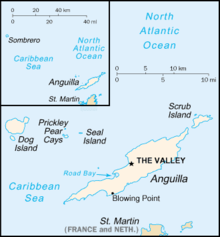Dog Island, Anguilla: Difference between revisions
No edit summary Tags: Mobile edit Mobile web edit |
m Reverted edits by 83.166.190.42 (talk) to last version by ClueBot NG |
||
| Line 1: | Line 1: | ||
[[File:Anguilla-CIA WFB Map (2004).png|thumb||right|Map of Anguilla; Dog Island lies west of the [[Prickley Pear Cays]]]] |
[[File:Anguilla-CIA WFB Map (2004).png|thumb||right|Map of Anguilla; Dog Island lies west of the [[Prickley Pear Cays]]]] |
||
'''Dog Island'' |
'''Dog Island''' is an uninhabitated small island of {{convert|207|ha|acre|abbr=on}} in size located approximately {{convert|13|km|mi|abbr=on}} to the north-west of [[Anguilla]].<ref name="ref1">[http://www.anguillanews.com/ecocorner/0002.php Dog Island: A Seabird’s (and Seabirders’) Paradise], ''Anguilla News'', Retrieved October 18, 2010</ref><ref name="maroon">[http://news.google.com/newspapers?id=y-wvAAAAIBAJ&sjid=nUQDAAAAIBAJ&pg=3752,2367572 Two St. Croix Couples Marooned On Dog Isle], ''[[The Virgin Islands Daily News]]'', May 5, 1970</ref><ref name="3rd">[http://books.google.com/books?id=PEAZAAAAYAAJ&pg=PA136&dq=%22dog+island%22#v=onepage&q=%22dog%20island%22&f=false The West India Pilot], p. 136-37 (1887)</ref> It is low and rocky, with three small [[cay]]s off the west and north coasts. The coastline is characterised by low cliffs alternating with sandy beaches. Large ponds lie inside two of the beaches.<ref name=bli/> |
||
==Flora and fauna== |
==Flora and fauna== |
||
Revision as of 14:41, 13 November 2015

Dog Island is an uninhabitated small island of 207 ha (510 acres) in size located approximately 13 km (8.1 mi) to the north-west of Anguilla.[1][2][3] It is low and rocky, with three small cays off the west and north coasts. The coastline is characterised by low cliffs alternating with sandy beaches. Large ponds lie inside two of the beaches.[4]
Flora and fauna
The central part of the island is covered in thorny scrub with prickly pear. The island, with the adjacent cays, has been identified as an Important Bird Area by BirdLife International because it is home to large numbers of nesting seabirds, mainly sooty terns with over 100,000 pairs recorded. Other seabirds breeding in smaller numbers include red-billed tropicbirds, magnificent frigatebirds, masked and brown boobies, laughing gulls, bridled terns and brown noddies. Reptiles present include the Anguilla Bank ameiva, Anguilla Bank anole, little dwarf gecko, island least gecko and a Mabuya skink. There are also feral goats.[4]
References
- ^ Dog Island: A Seabird’s (and Seabirders’) Paradise, Anguilla News, Retrieved October 18, 2010
- ^ Two St. Croix Couples Marooned On Dog Isle, The Virgin Islands Daily News, May 5, 1970
- ^ The West India Pilot, p. 136-37 (1887)
- ^ a b "Dog Island". BirdLife data zone: Important Bird Areas. BirdLife International. 2012. Retrieved 2012-11-21.
